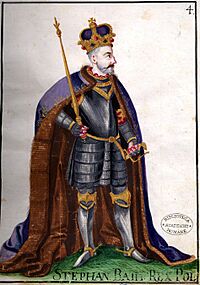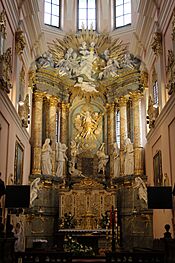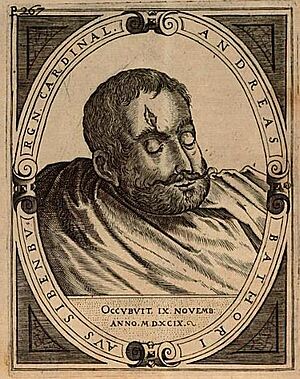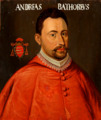Andrew Báthory facts for kids
Quick facts for kids Andrew Báthory |
|
|---|---|
| Cardinal-deacon of Sant'Adriano al Foro | |
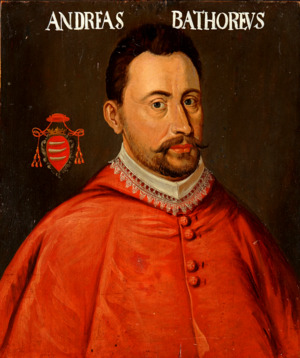 |
|
| Prince-Bishop of Warmia | |
| Reign | 1589–1599 |
| Predecessor | Marcin Kromer |
| Successor | Piotr Tylicki |
| Prince of Transylvania | |
| Reign | 1599 |
| Predecessor | Sigismund Báthory |
| Successor | Michael the Brave (de facto) |
| Born | 1562 or 1563 |
| Died | 3 November 1599 (aged 36–37) Csíkszentdomokos, Principality of Transylvania |
| Burial | St. Michael's Catholic Cathedral, Gyulafehérvár, Principality of Transylvania |
| House | Báthory family |
| Father | Andrew Báthory |
| Mother | Margit Majláth |
| Religion | Roman Catholic |
Andrew Báthory (Hungarian: Báthory András; Polish: Andrzej Batory; born 1562 or 1563 – died 3 November 1599) was an important figure in European history. He was a Cardinal-deacon in the Catholic Church from 1584. He also served as the Prince-Bishop of Warmia from 1589. In 1599, he briefly became the Prince of Transylvania.
Andrew was the nephew of Stephen Báthory, who was the powerful ruler of the Polish–Lithuanian Commonwealth. Stephen Báthory had no children, so Andrew was his favorite nephew. In 1578, Andrew moved to Poland at his uncle's request. He studied at a Jesuit school in Pułtusk. Later, he began his career in the church.
In 1584, Pope Gregory XIII made Andrew a cardinal. A year later, he became a special assistant bishop in Warmia. After his uncle Stephen Báthory died in 1586, Andrew was considered a possible new ruler for Poland and Lithuania. However, he decided to support another candidate, Sigismund Vasa.
Andrew became the Prince-Bishop of Warmia in 1589. This happened after the previous bishop, Marcin Kromer, passed away. In the early 1590s, Andrew and his brother, Balthasar Báthory, had disagreements with their cousin, Sigismund Báthory, who was the Prince of Transylvania. These arguments were about the presence of Jesuits in Transylvania, which was mostly Protestant. They also disagreed about joining a powerful alliance against the Ottoman Empire.
Sadly, in 1594, Sigismund had Balthasar killed and took Andrew's lands. After some defeats, Sigismund decided to give up his rule in Transylvania in 1598. He gave it to the Holy Roman Emperor, Rudolph II. However, Sigismund returned a few months later.
Andrew and Sigismund made up, and Sigismund gave Transylvania to Andrew in March 1599. Andrew had support from Poland and the Ottoman Empire. But Rudolph II convinced Michael the Brave, the ruler of Wallachia, to attack Transylvania. Michael defeated Andrew's army in the Battle of Sellenberk. Andrew tried to escape to Poland, but he was captured and killed by local people.
Contents
Early Life and Family
Andrew was the youngest of four sons. His parents were András Báthory and Margit Majláth. His father worked for Isabella Jagiellon and her son, John Sigismund Zápolya. They ruled the eastern parts of Hungary. They were under the control of the Ottoman Sultan Suleiman the Magnificent.
We don't know Andrew's exact birth date. It was kept secret to help his church career. He was likely born in late 1562 or early 1563. His father died around that time, so Andrew might have been born after his father's death.
Andrew's mother married again in 1563. Andrew, his brother Balthasar, and their sisters lived with their stepfather. Even though his mother and stepfather were Lutherans, Andrew stayed Roman Catholic. This was like his father and uncles, Christopher and Stephen Báthory. Christopher was Andrew's legal guardian, but we don't know much about his role in Andrew's schooling.
After John Sigismund died in 1571, Stephen Báthory became the ruler of Transylvania. When Stephen was elected King of Poland in 1575, he became the Prince of Transylvania. Since King Stephen had no children, he decided to educate his nephew Andrew. In 1578, Andrew went to Poland. He studied at a Jesuit school in Pułtusk. His classmates were from different backgrounds, including Protestants from Transylvania. Andrew learned to speak Latin, Italian, Polish, and German.
Andrew's Church Career
Becoming a Cardinal
Andrew was King Stephen Báthory's favorite nephew. The Pope's ambassador in Poland, Giovanni Andrea Caligari, encouraged the king to have Andrew join the church. Andrew was interested in churches and altars from a young age. However, his Protestant mother and relatives wanted him to choose a different path.
In 1581, Andrew got very sick with pneumonia. After he recovered, he decided to follow his uncle's wishes. He was worried about not being able to have children because of church rules. But his Jesuit teachers convinced him to accept his uncle's plan.
On September 16, 1581, Andrew became a canon in the Roman Catholic Diocese of Warmia. The local church leaders and Bishop Marcin Kromer were against this. But the new papal ambassador and the King of Poland convinced someone to step down for Andrew. Still, they thought Andrew was too young to become a special assistant bishop. In 1583, Andrew was chosen to lead the Monastery of Miechów.
King Stephen Báthory sent Andrew to Rome in 1583. His goal was to discuss an alliance against the Ottoman Empire. He also wanted Andrew to become a cardinal. Andrew met important church leaders, including Charles Borromeo, who was highly respected.
Andrew arrived in Rome on November 30. Five days later, Pope Gregory XIII met him. The Pope made him a special church official. The Pope wanted King Stephen to join an alliance against the Ottomans, but the king refused. Andrew then announced he would leave Rome. To keep him there, the Pope made him a cardinal-deacon on July 23, 1584. A famous composer, Giovanni Pierluigi da Palestrina, even wrote music for the Báthorys on this occasion. Andrew left Rome three days later.
Coadjutor Bishop and Political Role
Andrew returned to Poland on October 20, 1584. He settled in Miechów. He improved the monastery and started new church services. In July 1585, he became the assistant bishop in Warmia. He visited important towns like Gdańsk.
King Stephen Báthory wanted Andrew to become the Bishop of Kraków. But the Pope didn't agree because Andrew was still too young. The king also wanted to invade Russia. He sent Andrew to Rome again in 1586 to ask for the Pope's financial help. Andrew arrived in Rome on July 24.
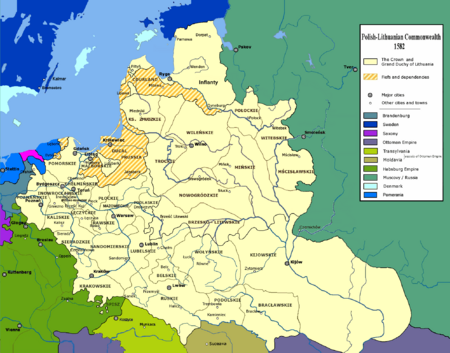
King Stephen Báthory died on December 13, 1586. Andrew quickly returned to Poland. He inherited lands in Transylvania from his uncle. Andrew, his brother Balthasar, and their cousin Sigismund Báthory were among the candidates for the Polish and Lithuanian throne.
Andrew's opponents caused trouble, even attacking the Miechów monastery. Andrew realized the Báthory family had little chance to win the throne. So, he supported Sigismund Vasa. Sigismund Vasa was elected king on August 19, 1587. However, others wanted Maximilian of Habsburg to be king. Maximilian attacked Kraków. Andrew convinced Sigismund Báthory's advisors to send soldiers from Transylvania to help fight Maximilian. Andrew was chosen to welcome the new king in Kraków. He also attended the king's coronation on December 27, 1587.
In Transylvania, Andrew's former classmates became important advisors to the young Sigismund Báthory. In 1588, the Jesuits were forced to leave Transylvania. Pope Sixtus V then punished Sigismund. Andrew went to Transylvania and wrote to Rome. He explained that the Jesuits' strong efforts to convert people had made them unpopular in the mostly Protestant region.
Bishop of Warmia and Later Conflicts
After Bishop Marcin Kromer died in March 1589, Andrew became the Prince-Bishop of Warmia. This also made him a member of the Senate of Poland. He wanted to make the Collegium Hosianum school into a university.
King Sigismund III Vasa wanted Andrew to be the assistant bishop of Kraków. But the Habsburg family didn't want Andrew to have that position. The Pope's new ambassador, who supported the Habsburgs, convinced the king to choose someone else. This was because Andrew had not yet become a priest. Most Polish nobles thought this was unfair, but the Pope confirmed the king's decision.
Andrew then suggested that the Pope send Franciscan friars to Transylvania instead of Jesuits. He also suggested making a Franciscan friar the Bishop of Transylvania. Andrew was allowed to set up church districts in Transylvania. This made him the actual head of the Catholic Church there.
In August 1591, Maximilian of Habsburg, who still wanted to rule Poland, asked Andrew for Transylvanian support. Andrew said Transylvania couldn't openly help because it was under Ottoman control. But he promised that Sigismund Báthory wouldn't stop Transylvanian soldiers from fighting in Poland.
Around the same time, Sigismund Báthory wanted the Jesuits to return to Transylvania. This caused a big family argument. Andrew and Balthasar refused to support Sigismund. Some rumors even said Andrew and his brothers wanted to remove Sigismund from power. The Pope sent someone to help them make peace.
Andrew had a conflict with the king over money. He held back some taxes, saying the king owed him money. He also talked with a German ruler about protecting Warmia. In May 1593, Andrew made peace with the king. He gave up his claim to the Kraków bishopric in exchange for another church position.
The Pope's new envoy came to Transylvania to urge Sigismund Báthory to join an alliance against the Ottomans. Sigismund was ready, but Andrew and Balthasar said Transylvania couldn't leave the Ottoman Empire without Poland's help. Most of Sigismund's advisors agreed with them. But Sigismund's Jesuit priest convinced him to continue talks with the Emperor. Andrew then left Transylvania for Poland.
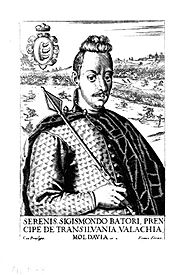
In August 1594, Sigismund Báthory's uncle, Stephen Bocskai, and other army leaders convinced the prince to get rid of those who didn't support the alliance. Balthasar Báthory and his allies were captured and killed. Sigismund also took Andrew's lands in Transylvania. The Diet (assembly) agreed with Sigismund, saying Andrew and his brother Stephen were traitors.
Andrew wrote to the Pope, calling his cousin a cruel ruler. He wanted to replace Sigismund with Stephen, with help from the Pope, England, and Poland. But they didn't get any support. The Pope invited Andrew to Rome, but he refused. At the Pope's request, Sigismund Báthory allowed Andrew's mother and Stephen's wife and children to move to Poland.
Andrew exchanged letters with Aaron the Tyrant, the ruler of Moldavia. The Pope's envoy tried to convince Andrew to become Poland's ambassador in Rome, but Andrew refused. He said his homeland needed him because Sigismund's anti-Ottoman policy couldn't last. Letters found on one of Stephen Báthory's men suggested that Andrew and his brother wrote to the leaders of the Székely commoners, who had rebelled against Sigismund in 1596.
After the Ottomans won several battles in 1596, Transylvanian nobles offered Andrew the principality. Andrew realized that neither the Pope nor the Polish king would help him against Sigismund. So, he said he was ready to make peace. He returned to Warmia and became a subdeacon in 1597. Andrew and Stephen even said they wouldn't interfere in Transylvania. They also started talking with Sigismund Báthory about getting their lands back.
Sigismund Báthory began talks about giving Transylvania to the Habsburgs. This worried both Poland and the Ottoman Empire. In February 1598, Andrew offered his church positions in Poland to Sigismund in exchange for Transylvania. But Sigismund had already signed an agreement with Rudolph II. Sigismund left Transylvania, and Rudolph's officials took over. However, Sigismund soon changed his mind and returned to Transylvania. In November, Sigismund offered Transylvania to Andrew. Andrew accepted and secretly left Poland. He met Sigismund in Kolozsvár in February 1599. Most people believed Andrew came to make peace with his cousin.
Prince of Transylvania
Sigismund Báthory gave up his rule at the Diet (assembly) in Medgyes on March 21. He suggested Andrew as his successor. Andrew promised not to seek revenge on those who had voted against him in 1594. The Diet then elected him prince on March 28. However, many powerful nobles still opposed Andrew, even if they didn't openly object.
Andrew's main supporters were young, poor nobles who had been forced to leave in 1594. Andrew had to choose his officials from Catholic lords. He couldn't even remove his opponents from important positions. For example, Gáspár Kornis remained a member of the royal council, even though he had been involved in the killing of Andrew's brother in 1594.
Andrew wanted to control the rulers of Moldavia and Wallachia. He first wanted to replace Michael the Brave, the ruler of Wallachia, with his brother Stephen. But Michael swore loyalty to Andrew on June 26. Andrew also started talks with the Ottoman Empire. He asked them to confirm his rule and his control over Wallachia. He also refused to pay tribute for six years.
In August, Sigismund Báthory's marriage was declared invalid. Andrew then proposed to her. However, Rudolph II did not recognize Andrew's rule. He urged Stephen Bocskai and Michael the Brave to invade Transylvania. Andrew accused Stephen Bocskai of treason. But he didn't believe reports that Michael was preparing to invade. He was surprised when Michael attacked Transylvania in October. The Székely commoners joined the invaders because Michael promised to restore their freedom.
On October 28, Michael defeated the Transylvanian army in the Battle of Sellenberk. Andrew, who had never fought in a battle, fled in a panic. The Transylvanian Diet recognized Michael as Rudolph II's representative.
Andrew tried to escape to Poland. But Székely serfs captured him on a mountain near Csíkszentdomokos on November 3. He was killed with a shepherd's axe. His head was cut off and taken to Michael the Brave, who sent it to the Pope's envoy. A Greek artist painted the head before it was sewn back onto the body. Andrew was formally buried in St. Michael's Cathedral in Gyulafehérvár on November 24.
See Also
Images for kids
|
Andrew Báthory
Born: 1562/63 Died: 3 November 1599 |
||
| Catholic Church titles | ||
|---|---|---|
| Preceded by Marcin Kromer |
Prince-Bishop of Warmia 1589–1599 |
Succeeded by Piotr Tylicki |
| Regnal titles | ||
| Preceded by Sigismund Báthory |
Prince of Transylvania 1599 |
Vacant
Land of the Hungarian Crown
Title next held by
Sigismund Báthory |


